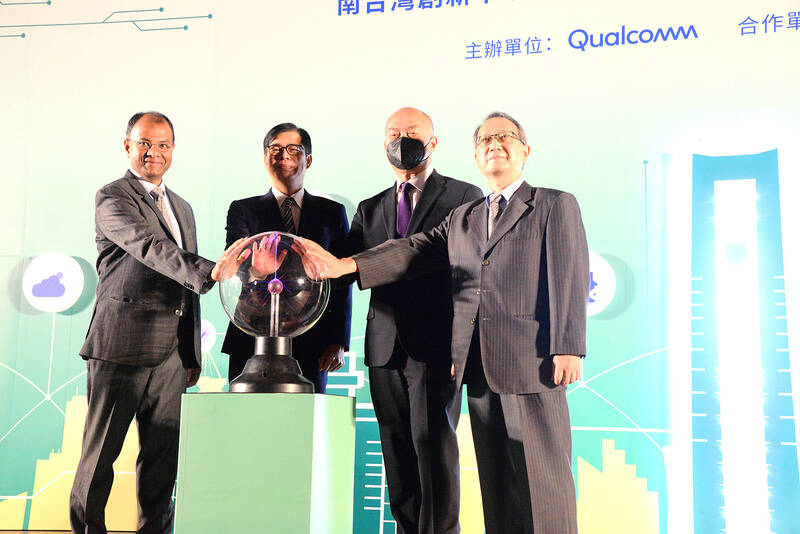Qualcomm Inc yesterday inaugurated a new innovation center in Kaohsiung as it steps up efforts to foster local start-ups and a 5G technology ecosystem in the city, following in the footsteps of its local partners.
The US chip company’s move fits the Kaohsiung City Government’s plan to build a semiconductor supply chain within the next five years, highlighted by Taiwan Semiconductor Manufacturing Co’s (TSMC, 台積電) first chip plant in the city.
TSMC plans to start building the factory by the end of this year, and to start production of 28-nanometer and 7-nanometer chips there in 2024.

Photo: Hsu Li-chuan, Taipei Times
Qualcomm said it had been considering setting up operations in Kaohsiung for the past two years, as it had found that more customers, partners and start-ups have expanded their operations to the city.
Some of the start-ups participating in the innovation challenges arranged by Qualcomm are from southern Taiwan, the company said.
“Some of our partners have started building their operations in Kaohsiung, such as Compal Electronics Inc (仁寶), which unveiled a 5G AIoT [artificial Internet of Things] research center in August,” Qualcomm Taiwan president S. T. Liew (劉思泰) told reporters in Kaohsiung.
“With our partners and start-ups thriving in southern Taiwan, we have to be here with them,” Liew said.
With the new Qualcomm Innovation Center, Southern Taiwan, Liew said the company aims to provide incubation support to start-ups, including business instructions, talent training, and advanced testing labs supporting 5G AIoT, O-RAN, small-cell base stations and robotics tests.
Qualcomm would also share its knowledge with the start-ups regarding patent applications, commercialization and technology support, he said.
Some start-ups have entered Qualcomm’s supply chain after joining programs created by Qualcomm’s Taipei Innovation Center, Liew said.
The innovation center in the Asia New Bay Area 5G AIoT Innovation Park in Kaohsiung is its second one in Taiwan.
The company has also set up similar innovation centers in Vietnam and India, given the robust start-up and technology ecosystems in those countries, Qualcomm vice president Sudeepto Roy told reporters.
Qualcomm has tripled its workforce in Taiwan to about 1,500 from about 500 since Liew took the company’s reins in 2016 to support its rapid business expansions.
The company is recruiting engineers specialized in software and hardware design, it said.

South Korea’s equity benchmark yesterday crossed a new milestone just a month after surpassing the once-unthinkable 5,000 mark as surging global memory demand powers the country’s biggest chipmakers. The KOSPI advanced as much as 2.6 percent to a record 6,123, with Samsung Electronics Co and SK Hynix Inc each gaining more than 2 percent. With the benchmark now up 45 percent this year, South Korea’s stock market capitalization has also moved past France’s, following last month’s overtaking of Germany’s. Long overlooked by foreign funds, despite being undervalued, South Korean stocks have now emerged as clear winners in the global market. The so-called “artificial intelligence

‘SEISMIC SHIFT’: The researcher forecast there would be about 1.1 billion mobile shipments this year, down from 1.26 billion the prior year and erasing years of gains The global smartphone market is expected to contract 12.9 percent this year due to the unprecedented memorychip shortage, marking “a crisis like no other,” researcher International Data Corp (IDC) said. The new forecast, a dramatic revision down from earlier estimates, gives the latest accounting of the ongoing memory crunch that is affecting every corner of the electronics industry. The demand for advanced memory to power artificial intelligence (AI) tasks has drained global supply until well into next year and jeopardizes the business model of many smartphone makers. IDC forecast about 1.1 billion mobile shipments this year, down from 1.26 billion the prior

NEW IDENTITY: Known for its software, India has expanded into hardware, with its semiconductor industry growing from US$38bn in 2023 to US$45bn to US$50bn India on Saturday inaugurated its first semiconductor assembly and test facility, a milestone in the government’s push to reduce dependence on foreign chipmakers and stake a claim in a sector dominated by China. Indian Prime Minister Narendra Modi opened US firm Micron Technology Inc’s semiconductor assembly, test and packaging unit in his home state of Gujarat, hailing the “dawn of a new era” for India’s technology ambitions. “When young Indians look back in the future, they will see this decade as the turning point in our tech future,” Modi told the event, which was broadcast on his YouTube channel. The plant would convert

People stand in a Pokemon store in Tokyo on Thursday. One of the world highest-grossing franchises is celebrated its 30th anniversary yesterday.